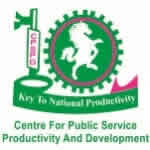|
|
Accounting and Finance for Non-Financial Managers Course
By: Centre for Public Service Productivity and DevelopmentLagos State, Nigeria 17 - 19 Jun, 2025 3 days
NGN 265,000Get 5.00% off
|
Venue: Lagos
Other Dates
| Venue | Date | Fee | |
|---|---|---|---|
| Lagos, Lagos State, Nigeria | 09 - 11 Sep, 2025 | NGN265000 | |
| Lagos, Lagos State, Nigeria | 09 - 11 Dec, 2025 | NGN265000 |
As a manager, you wear many hats managing people and other resources. Because your company’s goal is to make huge returns to stakeholders, you want to clearly know how you can show The Financial Results in the financial statements of the company. Because of that, you want to be confident in your ability to read and interpret Financial Statements so that you can be an effective, efficient and asset.
The good news is you can now learn to use these tools to increase your knowledge and skills. You do not have to be a financial expert before attending the course because in this training, you will learn the financial tools and language in a highly hands-on and practical way. Whether you are managing day to day operations or planning for growth or new product lines, these tools will be invaluable to the decision-making process. Attend the effective Accounting and Finance for Non-Finance Managers program today.
Learning Outcomes
By the end of the course, the delegates will be able to:
- Increase your financial literacy and financial vocabulary for business and work.
- Obtain a competitive edge by understanding the basics principles of accounting and fundamentals of finance and accounting.
- Expose yourself to budgetary planning and variance analysis so that you think like an accountant too.
- Manage cost and increase efficiency of your projects/ departments/ divisions / company or organization.
- Acquire the skills to detect early warning signs of possible projects or business failure so that you can make wiser decisions.
- Grasp and understand useful Financial Tools and techniques required for effective decision making.
- Stress on the importance of business units in achieving corporate business objective.
Course Content
Module 1: Speaking Accounting
- Understanding why accounting / finance is important?
- Know the objective of a business / Organization.
- A brief history of accounting and the purpose of Financial Reports
Module 2: Accounting Framework
- Understand the different between Conceptual Framework and Regulatory Framework
- What are the Fundamental Accounting Concept and assumption used in preparing Accounting Records and why these are being used?
Module 3: Types Of Accounts
- Differentiate between Assets, Liabilities, Expenses, Income and Equity
- Understanding the Accounting Equation
- Assets = Liabilities + Equity
- Differentiate between OPEX and CAPEX
Module 4: Reading Financials
- Introduction to the various Financial Statements and their uses
- Statement of profit or loss and other comprehensive income
- Statement of financial position
- Statement of changes in equity
- Statement of cash flows
- Tools use in Financial Statement Analysis
- Vertical Analysis
- Horizontal Analysis (Trend Analysis)
- Ratios Analysis – operational ratios, financial ratios, and valuation ratios
- Statement of cash flows
- The difference between Profit and Cash and why the saying “Cash is King”.
- How to analyse the statement of cash flows
- Other considerations
- How to read Notes to the Accounts in Published Financial Statement
- Different between Publish Accounts and Management Accounts
- What are the Limitations of Ratio Analysis?
Module 5: Building Budget
- Types of budgets
- Differentiate the various types of budgets – Incremental, Zero-based, and Rolling
Module 6: Comparing Budget Approaches
- When and which is better - Top-down or Bottom-up approach?
Module 7: Budgeting as A Planning and Control Tool
- Using the budget to control the business and what are the limitation factors.
- Understanding the Budgeting process and its coordination
- How to forecast sales revenues and expenses and building up the budget’s numbers
- When to adjust the budget to reality
Module 8: Costing Decision
- Cost Behaviour
- How is Cost being define?
- How to differentiate between the direct and indirect cost?
- Differentiate the controllable and uncontrollable cost.
- Cost – Volume – Profit Analysis
- Learning the Contribution formula and thus working with the Break –even Point analysis.
- How to decide on the Pricing?
Module 9: Investment Appraisal
- Understand the basic investment appraisals such as Payback analysis, Return on Investment (ROI) and Net Present Value (NPV) to better make sound decisions.
Who Should Attend?
- If you’re in a role and are in some ways involved in Financial Decisions – You Should Attend This Finance for Non-Finance Manger's hands on program.
- All savvy managers and executives in functions like:
- Sales and Marketing
- Production and Engineering
- Human Resources and Finance and Accounting
- Purchasing and Procurement
- R and D / Production Development
- Anyone who is determined to be successful in his / her career.
Methodology
This Finance for Non-Finance Manager's training’s methodology is a combination of expert input, interactive practical exercises, self-assessment, lots of hands-on role-play, group discussions, exercise worksheets, practical projects, and presentations.
Course Booking
Please use the “book now” or “inquire” buttons on this page to either book your space or make further enquiries.
| Lagos | Jun 17 - 19 Jun, 2025 |
| Lagos, Lagos State, Nigeria | 09 - 11 Sep, 2025 |
| Lagos, Lagos State, Nigeria | 09 - 11 Dec, 2025 |
| NGN 265,000.00 | (The program fees covers tuition, Course Materials, Tea/Coffee and Break, Lunch, Bag, Certificate of participation and administration) |
Dr Chris Egbu +2348023194131
Related Courses
 Excellence in Crisis Communication and Public Information Management Course
Excellence in Crisis Communication and Public Information Management Course
4 days, 24 - 27 Jun, 2025
Centre for Public Service Productivity and Development
 Building Education and Leadership Capacity : A Practical Guide to Academic Transformation
Building Education and Leadership Capacity : A Practical Guide to Academic Transformation
5 days, 21 - 25 Jul, 2025
Centre for Public Service Productivity and Development
 Making Policy More Effective- Evaluating the Effect and Impact of Policy Decisions Workshop
Making Policy More Effective- Evaluating the Effect and Impact of Policy Decisions Workshop
4 days, 27 - 30 May, 2025
Centre for Public Service Productivity and Development
 Returning to our Founding Principles: The Challenges Facing the Labour Union Movements
Returning to our Founding Principles: The Challenges Facing the Labour Union Movements
3 days, 24 - 26 Jun, 2025
Centre for Public Service Productivity and Development
Currency Converter




.png)